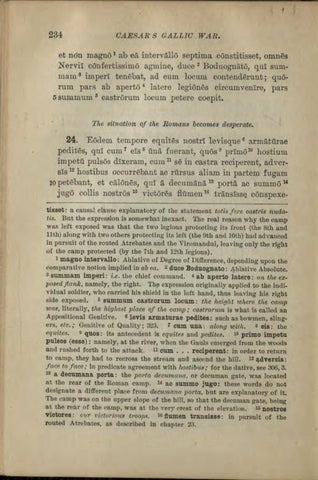234
CAESAR'S
GALLIC
WAR.
et non magno 1 ab ell intervallo septima constitisset, omnes NerviI confertissimo agmine, duee 2 Boduognato, quI summam 3 imperI tenebat, ad eum locum eontenderunt ; quorum pars ab aperto 4 latere legiones circum ventre, pars 5 summum 5 castrorum locum petere coepit. The situation of the Romans becomes desperate.
24. Eodem tempore equites nostrI levisque S armatnrae pedites, quI cum T eis 8 una fuerant, quos 9 prlmo10 hostium impetn pulses dtxeram, cum 11 se in castra reciperent, adversrs 12 hostibus occurrebant ac rnrsus aliam in partem fugam 10 petebant, et calones, qui a decumana 13 porta ac summo 14 jugo collis nostros 15 victores flnmen 16 transisst;l conspexetis set : a causal clause explanatory of the statement totis fere castris nudatis. But the expression is somewhat inexact. The real reason why the camp was left exposed was that the two legions protecting its front (the 8th and 11th) along with two others protecting its left (the 9th and 10th) had ad vanced in pursuit of the routed Atrebates and the Viromandui, leaving only the right of the camp protected (by the 7th and 12th legions). 1 mapa intervallo: Ablative of Degree of Difference, depending upon the comparative notion implied in ab ea. 2 duce Boduognato: 4-blative Absolute. 8 summam imperi: i.e. the chief command. 4 ab aperto latere: on the ezposed flank, namely, the right. The expression originally applied to the individual soldier, who carried his shield in the left hand, thus leaving his right side exposed. 6 summum castrorum locum: the hei[Jht where the camp was, literally, the highest place of the camp .. castrorum is what is called an Appositional Genitive. slevis armaturae pemtes: such as bowmen, slingers, etc... Genitive of Quality; 323. T cum una: along with. 8 eis: the equites. 9 quos: its antecedent is equites and pedites, 10 primo impetu puIs os (esse): namely, at the river, when the Gauls emerged from the woods and rushed forth to the attack. 11 cum ... reciperent: in order to return to camp, they had to recross the stream and ascend the hill. 12 q.dversis: face to face .. in predicate agreement with hostibus .. for the dative, see 306,3. 18 a decumana porta: the porta decumann, or decuman gate, was located at the rear of the Roman camp. 14 ac summo jugo: tbese words do not designate a different place from decumana porta, but are explanatory of it. The camp was on the upper slope of the hill, so that the decuman gate, being at the rear of the camp, was at the very crest of the elevation. 16 nostros victores: our victorious troops. 16 t1umen transiss8: in pursuit of the routed Atrebates, as described in chapter 23.
